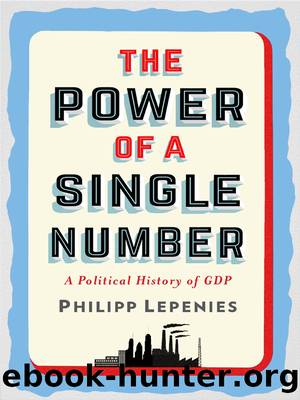The Power of a Single Number by Philipp Lepenies

Author:Philipp Lepenies
Language: eng
Format: epub
Tags: BUS023000, Business & Economics/Economic History, HIS037070, History/Modern/20th Century
Publisher: Columbia University Press
Published: 2016-05-03T00:00:00+00:00
5
WAR, KIDNAPPING, AND DATA THEFT
Germany
As far as surveying national income was concerned, Germany was a latecomer. This was, of course, partly because Germany was not politically unified into a single country until 1871. Before that, it was made up of dozens of sovereign territories, each with its own head of state, currency, tax laws, and statistical offices. Although numerous national income statistics had been compiled for the various small German states during the nineteenth century (on the basis of income data from tax statistics), the calculations were made only irregularly and mostly unofficially, and the available data was considered insufficient. Moreover, the German economists’ guild doubted that the figures were of any use. British and French attempts to quantify national income were likewise deemed of little utility to them.
In fact, it seemed as though such calculations could be highly risky. In 1870, Prussia and a coalition of German states went to war with France. Otto von Bismarck, the Prussian chancellor, used the war as a pretext to forge a unified German state, the German Reich, under Prussian hegemony. In addition to defeating France militarily and taking the Emperor Napoleon III hostage, Bismarck seized every possible opportunity to humiliate France. He founded the new German Reich at Versailles, and he imposed exorbitant reparations payments on France. To determine the sum that would economically debilitate the country for years, Bismarck used French estimates of national income. International experts considered these estimates to be inflated. Yet, because they came from French statisticians, Bismarck was able to invoke them and, in so doing, deliberately dupe the French into the bargain.1
It was not until 1899 that an estimate of national income was computed for the entire German Reich. However, this was based solely on a rough extrapolation of a few regional income statistics. It had little significance.2
It was economist Karl Helfferich, who would later become secretary for the Treasury of the German Reich and member of the executive board of Deutsche Bank, who presented the first comprehensive national income estimate for the German Reich, in 1913. As had been the case in all other historical attempts to calculate national income, his endeavor was not commissioned by the government. Helfferich based his analyses on tax estimates. With his calculations, which covered the period 1896 to 1912, he sought to study economic development during the reign of Wilhelm II, and in the best tradition of Petty’s political arithmetic, he compared his findings with figures from Britain and France. Considering average per capita income, Helfferich noticed that Germany had seemingly overtaken France, in economic terms, during the preceding decades but that it still lagged significantly behind Britain. Helfferich is praised as a pioneer in Paul Studenski’s classic history of national income calculation, and he endeavored to present data evidencing the Reich’s constant, stable economic progress.3
Helfferich died in 1942, but in the final years of his life as a conservative politician, he contributed considerably to the political destabilization of the young Weimar Republic. His paper Fort mit Erzberger (Do
Download
This site does not store any files on its server. We only index and link to content provided by other sites. Please contact the content providers to delete copyright contents if any and email us, we'll remove relevant links or contents immediately.
Zero to IPO: Over $1 Trillion of Actionable Advice from the World's Most Successful Entrepreneurs by Frederic Kerrest(4575)
Machine Learning at Scale with H2O by Gregory Keys | David Whiting(4313)
Never by Ken Follett(3958)
Harry Potter and the Goblet Of Fire by J.K. Rowling(3860)
Ogilvy on Advertising by David Ogilvy(3624)
Shadow of Night by Deborah Harkness(3370)
The Man Who Died Twice by Richard Osman(3081)
Book of Life by Deborah Harkness(2939)
The Tipping Point by Malcolm Gladwell(2927)
Will by Will Smith(2922)
Purple Hibiscus by Chimamanda Ngozi Adichie(2858)
0041152001443424520 .pdf by Unknown(2846)
My Brilliant Friend by Elena Ferrante(2832)
How Proust Can Change Your Life by Alain De Botton(2816)
How to Pay Zero Taxes, 2018 by Jeff A. Schnepper(2655)
Hooked: A Dark, Contemporary Romance (Never After Series) by Emily McIntire(2556)
Rationality by Steven Pinker(2367)
Can't Hurt Me: Master Your Mind and Defy the Odds - Clean Edition by David Goggins(2343)
Borders by unknow(2316)
